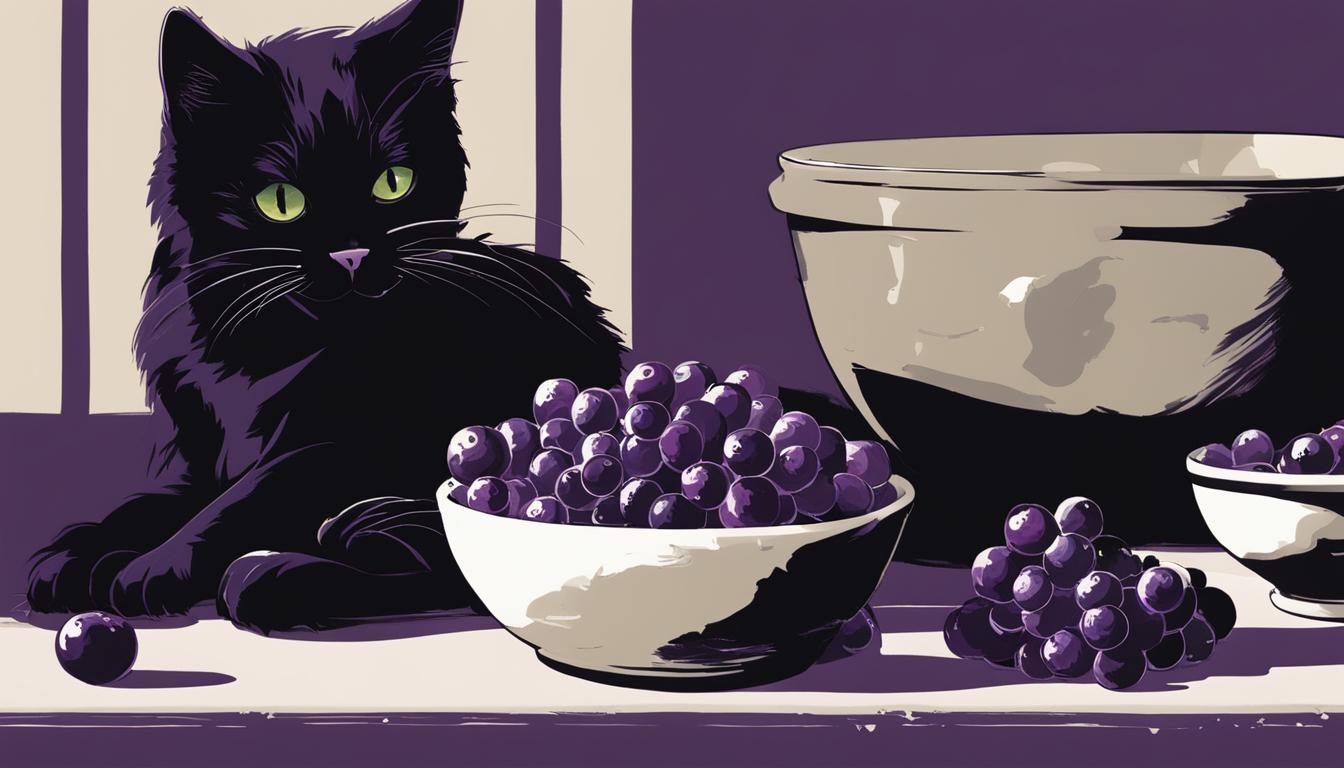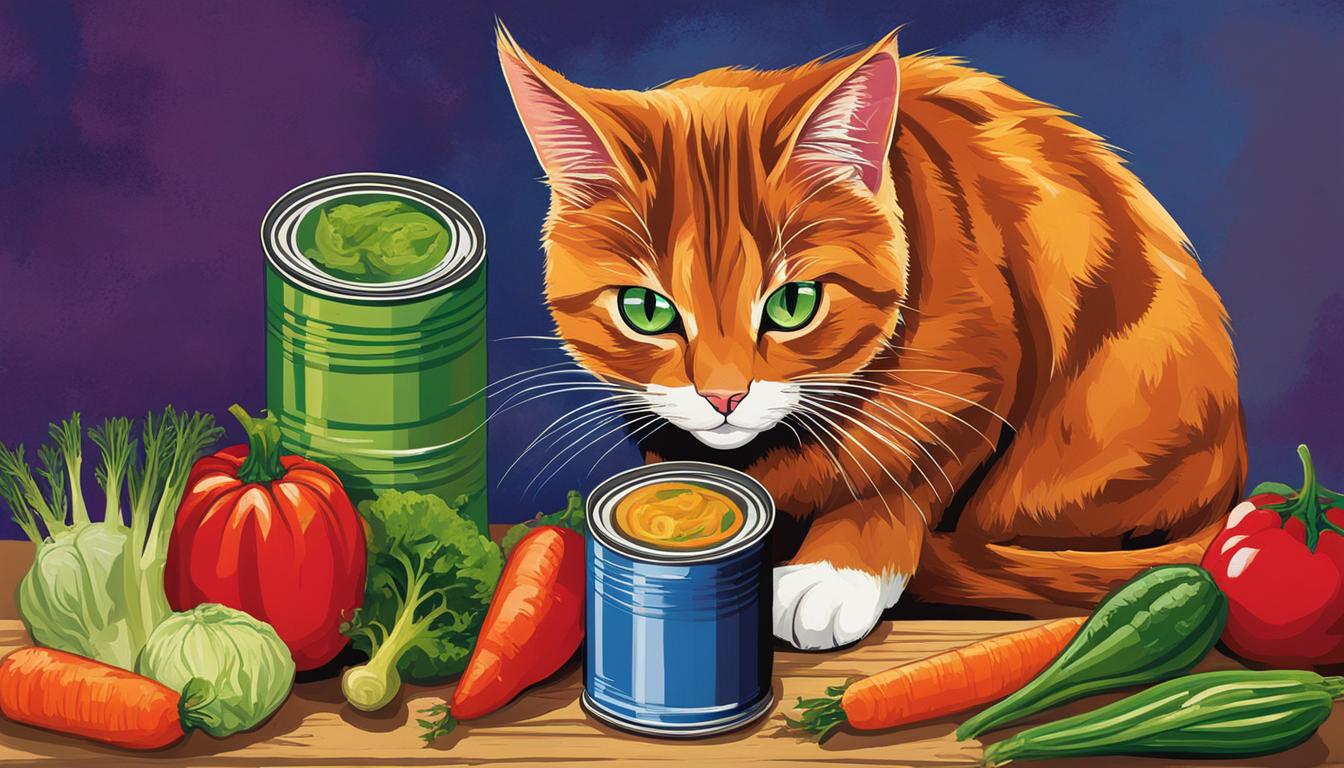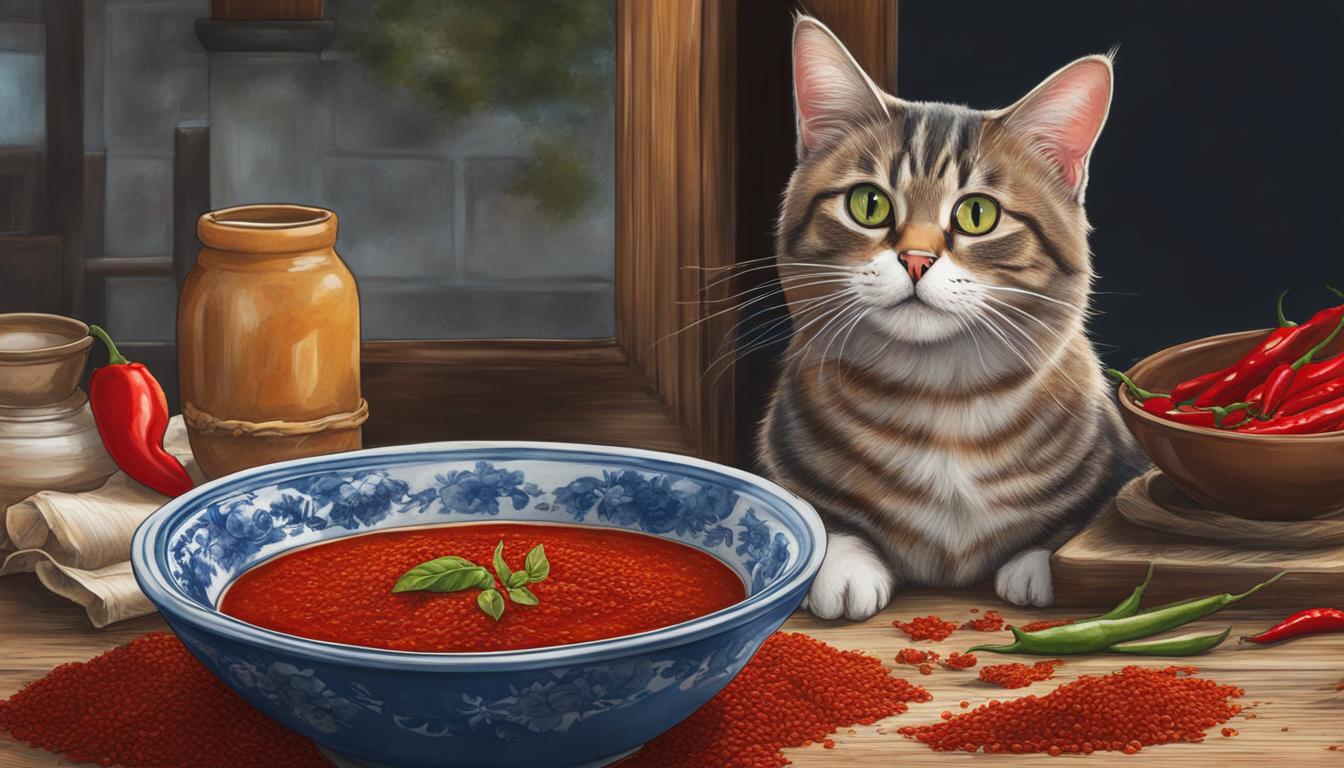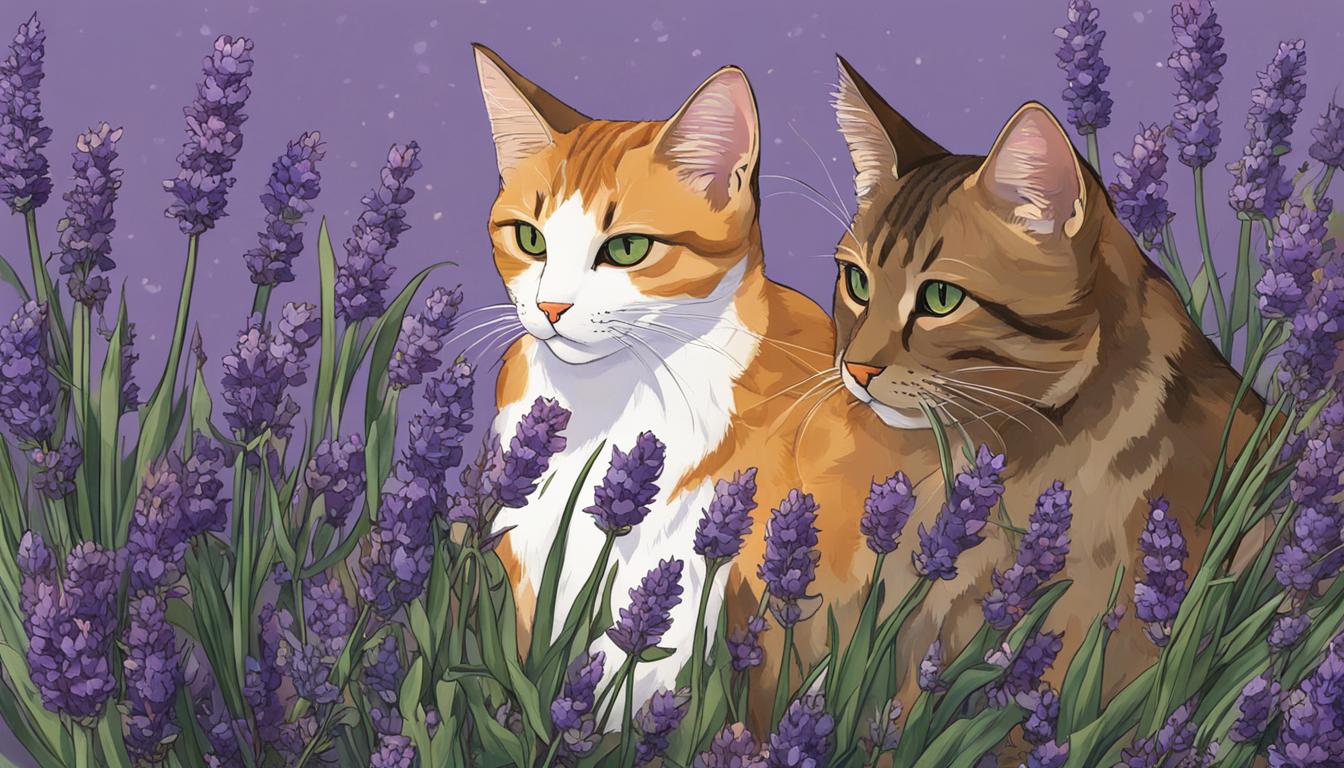Have you ever wondered if your furry feline friend can enjoy a juicy grape or a handful of raisins? As a cat owner, I know how tempting it can be to share our favorite snacks with our pets. However, when it comes to grapes and raisins, it’s essential to exercise caution.
While the research on grape toxicity in cats is limited, veterinarians strongly advise against feeding cats grapes or raisins. These seemingly innocent fruits can pose significant risks to our feline companions, potentially causing acute kidney injury and even kidney failure.
The exact cause of grape toxicity in cats remains unknown, but studies suggest that the main injury occurs in the kidney cells. Anecdotal evidence suggests that cats may develop kidney failure after consuming grapes, although the specific amount required to cause illness is still uncertain. To prioritize their health, it is best to avoid feeding grapes or raisins to cats altogether. And if your cat happens to ingest them accidentally, seek immediate veterinary attention.
Key Takeaways:
- The consumption of grapes and raisins can be harmful to cats and may potentially lead to acute kidney injury or failure.
- Veterinarians advise against feeding cats grapes or raisins due to the lack of understanding regarding their specific toxic properties.
- Symptoms of grape or raisin poisoning in cats may include vomiting, diarrhea, lethargy, loss of appetite, increased thirst, stomach pain, weakness, dehydration, and tremors.
- If you suspect your cat has ingested grapes or raisins, immediate veterinary care is crucial for prompt treatment and minimizing risks.
- Instead of grapes and raisins, consider offering safe alternative treats for cats, like small pieces of fresh berries or mashed pumpkin in limited quantities.
Grape and Raisin Toxicity in Cats
Grapes and raisins can be highly toxic to cats, potentially leading to acute kidney injury and kidney failure. While there is limited research on grape toxicity in cats, it is recommended to avoid feeding these fruits to your feline companion due to the potential risks involved. Although grape toxicity in cats has not been officially documented, it is important to be aware of the potential dangers and act swiftly if you suspect your cat has ingested grapes or raisins.
Symptoms of grape or raisin poisoning in cats may include vomiting, diarrhea, lethargy, loss of appetite, increased thirst, stomach pain, weakness, dehydration, and tremors. Kidney failure can develop within three days, and in severe cases, the kidneys may stop producing urine. If you notice any of these symptoms or suspect grape ingestion, it is crucial to contact your veterinarian or an emergency animal poison control center immediately.
Prompt treatment is necessary to minimize the risks associated with grape toxicity. While there is no specific antidote for grape toxicity in cats, your veterinarian may induce vomiting to remove the toxic food from your cat’s system. They may also administer activated charcoal to absorb any remaining toxins. In cases of significant grape ingestion, your veterinarian may recommend IV fluids and other supportive therapies to help your cat recover. Remember, time is of the essence when it comes to grape poisoning in cats, so seek immediate veterinary care.
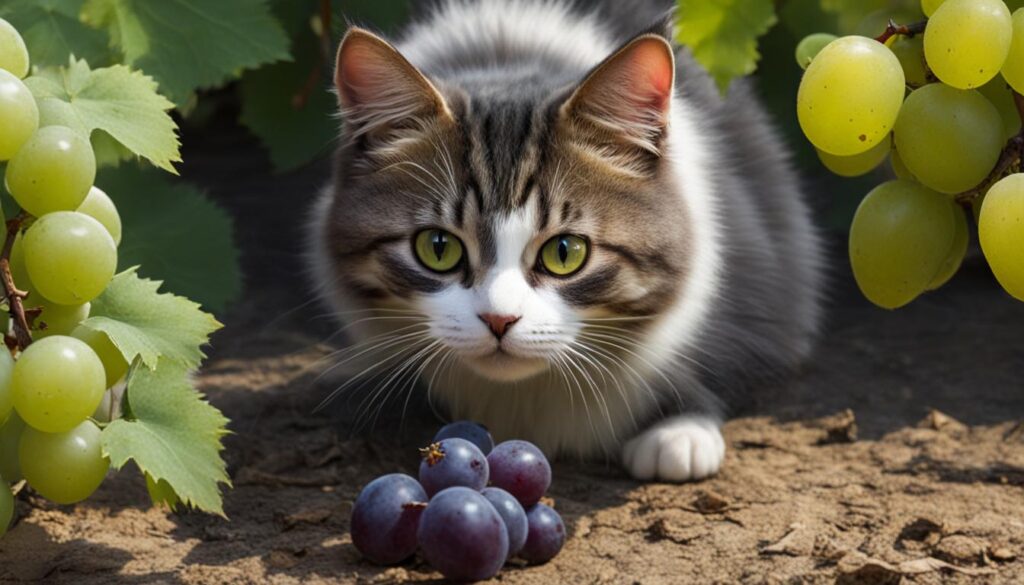
Table: Common Symptoms of Grape and Raisin Poisoning in Cats
| Symptoms | Description |
|---|---|
| Vomiting | Expelling stomach contents forcefully |
| Diarrhea | Loose or watery stools |
| Lethargy | Extreme tiredness and lack of energy |
| Loss of appetite | Decreased interest in food |
| Increased thirst | Excessive drinking of water |
| Stomach pain | Discomfort or distress in the abdominal area |
| Weakness | Lack of strength or energy |
| Dehydration | Lack of sufficient body fluids |
| Tremors | Involuntary shaking or quivering |
First Aid for Grape Ingestion in Cats
If your cat has eaten grapes or raisins, it is crucial to take immediate action and administer the appropriate first aid. While there is no specific antidote for grape toxicity in cats, there are steps you can take to help minimize the risks and support your cat’s health.
Step 1: Remove the toxic food
The first step is to remove the grapes or raisins from your cat’s system. This can be done by inducing vomiting under the guidance of a veterinarian. It is important to note that inducing vomiting should only be done under professional supervision to prevent any complications.
Step 2: Administer activated charcoal
Activated charcoal can be given to help absorb any remaining toxins in your cat’s digestive system. This can be administered by a veterinarian to ensure the correct dosage and effectiveness.
Step 3: Provide supportive care
In cases of significant grape ingestion, your veterinarian may recommend additional supportive care such as intravenous (IV) fluids to help flush out the toxins and maintain hydration. They may also suggest other supportive therapies based on your cat’s specific condition and needs.
Remember, it is important to always seek immediate veterinary care when your cat has ingested grapes or raisins. Timely intervention and professional guidance are crucial to minimizing the risks and ensuring your cat’s well-being.
Safe Alternatives to Grapes and Raisins for Cats
While grapes and raisins are not safe for cats to consume, there are alternative fruit treats that can provide a delicious and safe option for your feline companion. It’s important to remember that cats are obligate carnivores and their diet should primarily consist of meat. However, small portions of certain fruits can be given as occasional treats, adding variety to their diet and satisfying their natural curiosity.
Table: Safe Fruit Treats for Cats
| Fruit | Serving Size |
|---|---|
| Fresh or frozen berries (blueberries, strawberries) | 1-2 small pieces |
| Mashed pumpkin or sweet potato | 1-2 teaspoons |
These safe fruit treats can be offered to your cat in moderation, alongside their regular balanced diet. It’s important to note that dried fruits should be avoided, as they can be high in sugar and preservatives. Additionally, always introduce new foods gradually and monitor your cat for any signs of digestive upset. If you have any concerns about your cat’s diet or their ability to tolerate certain foods, consult with your veterinarian for personalized recommendations.
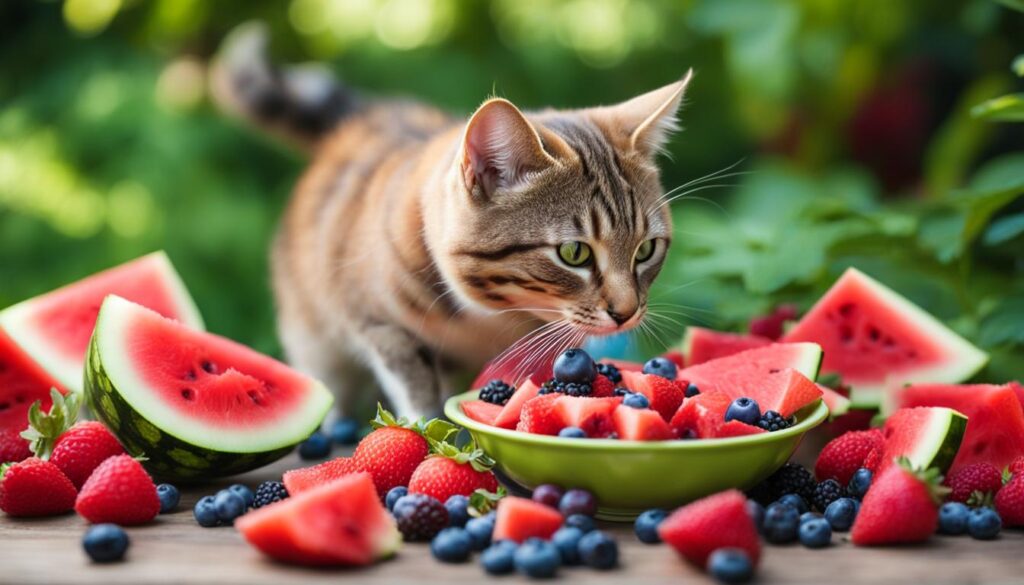
The Importance of a Balanced Feline Diet
When it comes to the health and well-being of our feline friends, providing them with a balanced and nutritionally complete diet is of utmost importance. Cats have unique dietary needs as obligate carnivores, meaning their bodies require nutrients found primarily in animal tissues. While occasional treats like fruits can be enjoyed by cats, they should not replace a high-quality cat food that meets all of their nutritional needs. Grapes and raisins, in particular, should be avoided due to the potential risks they pose to cat health.
Research on grape toxicity in cats is limited, but veterinarians advise against feeding cats grapes or raisins due to the potential for acute kidney injury and kidney failure. Although the exact cause of grape toxicity in cats is still unknown, it is believed to primarily affect kidney cells. Anecdotal evidence suggests that cats may develop kidney failure after consuming grapes, although the specific amount required to cause illness is uncertain. As a responsible cat owner, it is always better to err on the side of caution and avoid feeding grapes or raisins to your feline companion.
Consulting with your veterinarian is crucial to determine the ideal diet for your cat and address any specific dietary concerns or restrictions. They can recommend a high-quality cat food that provides all the essential nutrients your cat needs, including proteins, fats, vitamins, and minerals. Additionally, they can advise you on safe and approved treats that can be given to your cat in moderation. Remember, maintaining a balanced feline diet is key to ensuring their overall health and well-being.
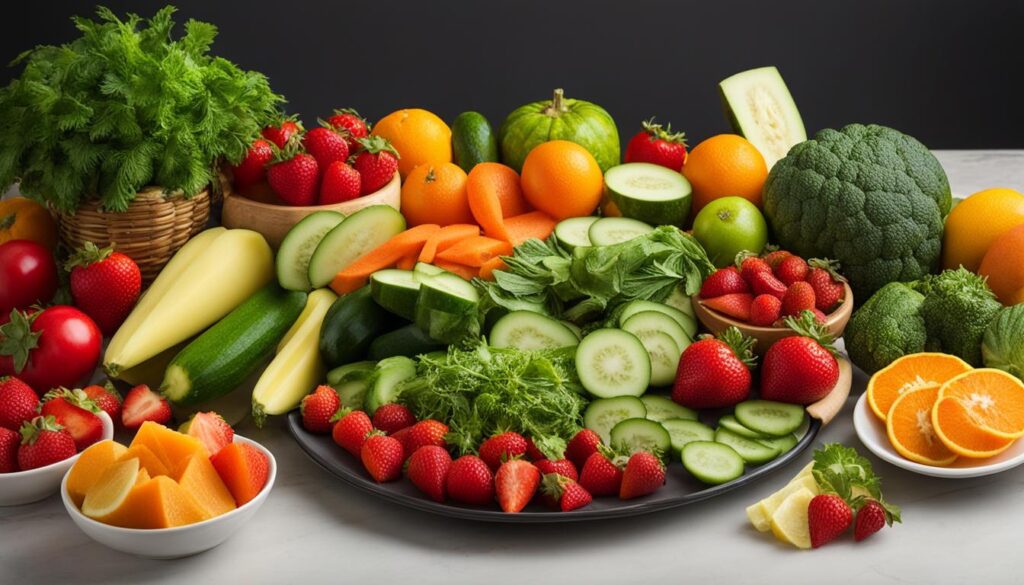
Safe Snacks for Cats
Incorporating safe snacks into your cat’s diet can provide them with variety and enrichment. While cats are primarily carnivorous, small portions of certain fruits can be given as occasional treats. Some safe alternatives to grapes and raisins include:
- Small pieces of fresh or frozen berries, such as blueberries or strawberries.
- Mashed pumpkin or sweet potato in limited quantities.
It’s important to note that dried fruits should be avoided as they can be high in sugar and preservatives. Always consult with your veterinarian before introducing any new foods into your cat’s diet to ensure they are safe and appropriate.
Other Foods to Avoid Feeding Cats
When it comes to feeding our feline friends, it’s important to be aware of the foods that can be harmful or even toxic to them. While cats may have a reputation for being curious eaters, there are several foods that can have serious consequences for their health. Here are some dangerous foods that you should always keep away from your furry companions:
Onions, Garlic, and Chives
Onions, garlic, and chives contain compounds that can break down a cat’s red blood cells, leading to a potentially life-threatening condition called anemia. Even small amounts can be harmful, so it’s best to avoid giving your cat any foods that contain these ingredients.
Dairy Products
Contrary to popular belief, cats are actually lactose intolerant, which means they lack the necessary enzymes to break down lactose, the sugar found in milk and other dairy products. Feeding your cat milk or cheese can result in digestive upset, including diarrhea and stomach discomfort.
Alcohol, Caffeine, and Chocolate
These substances are toxic to cats and can cause a range of symptoms, from restlessness and increased heart rate to tremors, seizures, and even death. It’s important to keep all foods and beverages containing alcohol, caffeine, or chocolate out of your cat’s reach.
Medications
Many medications that are safe for humans can be highly toxic to cats. It’s important to keep all medications securely stored and out of your cat’s reach. If your cat accidentally ingests any medication, contact your veterinarian immediately.
Bones, Raw Eggs, Raw Meat, and Raw Fish
While cats are natural hunters and carnivores, it’s best to avoid feeding them bones, raw eggs, raw meat, and raw fish. These foods can pose various health risks, including choking hazards, bacterial infections, and the potential for nutrient imbalances.
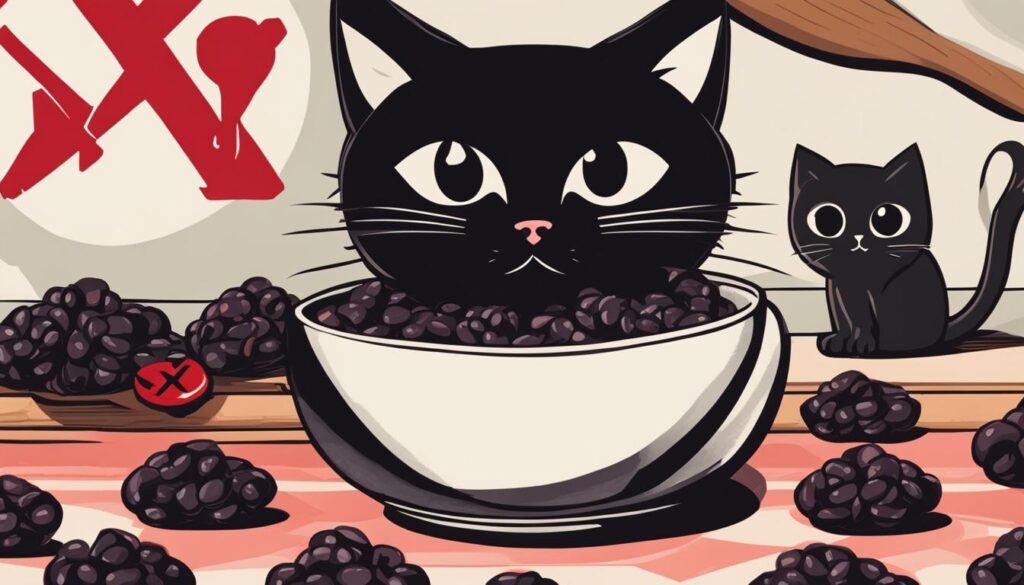
| Foods to Avoid Feeding Cats | Potential Health Risks |
|---|---|
| Onions, Garlic, and Chives | Anemia, breakdown of red blood cells |
| Dairy Products | Lactose intolerance, digestive upset |
| Alcohol, Caffeine, and Chocolate | Toxicity, restlessness, abnormal heart rate, tremors, seizures |
| Medications | Toxicity, adverse reactions |
| Bones, Raw Eggs, Raw Meat, and Raw Fish | Choking hazards, bacterial infections, nutrient imbalances |
Remember, the health and well-being of our beloved cats should always be a top priority. By avoiding these dangerous foods and providing a balanced and nutritionally complete diet, you can help ensure that your cat lives a long, happy, and healthy life.
Conclusion
As I wrap up this investigation into the potential dangers of grapes and raisins for cats, it becomes clear that these seemingly harmless fruits can pose serious risks to our feline friends. While the research on grape toxicity in cats is still limited, veterinarians unanimously advise against feeding cats grapes or raisins due to the potential for acute kidney injury and kidney failure. The exact cause of grape toxicity in cats remains unknown, but the alarming anecdotes of kidney failure after grape consumption cannot be ignored.
If you suspect that your cat has ingested grapes or raisins, it is vital to act swiftly and seek immediate veterinary attention. Symptoms of grape or raisin poisoning in cats, such as vomiting, diarrhea, and weakness, require prompt medical intervention to minimize the risks associated with kidney failure. Remember, prevention is always better than cure, so it’s best to avoid letting your cat snack on grapes or raisins altogether.
While it’s true that cats can be quite finicky eaters, we must prioritize their health and well-being by providing them with a balanced, nutritionally complete diet. Grapes and raisins are not necessary for cats and should be avoided entirely. Instead, consult with your veterinarian to determine the ideal diet for your feline companion, and consider safe alternatives like small pieces of fresh berries or mashed pumpkin as occasional treats.
By being mindful of what we feed our cats, we can ensure their longevity and happiness. Remember, a healthy cat is a happy cat!
FAQ
Can cats eat grapes or raisins?
No, grapes and raisins are harmful to cats and can potentially cause acute kidney injury and kidney failure.
What are the symptoms of raisin poisoning in cats?
Symptoms may include vomiting, diarrhea, lethargy, loss of appetite, increased thirst, stomach pain, weakness, dehydration, and tremors.
What should I do if my cat has ingested grapes or raisins?
Contact your veterinarian or an emergency animal poison control center immediately for prompt treatment and guidance.
Is there a specific antidote for grape toxicity in cats?
No, there is no specific antidote for grape toxicity. The first step is to remove the toxic food from the cat’s system under veterinary guidance.
What are some safe alternatives to grapes and raisins as treats for cats?
Small pieces of fresh or frozen berries (such as blueberries or strawberries) and mashed pumpkin or sweet potato can be given in limited quantities.
What should be the primary focus of a cat’s diet?
Cats are obligate carnivores, so their diet should primarily consist of meat. Treats should not replace a high-quality cat food that meets all of their nutritional needs.
What are other foods that should be avoided when feeding cats?
Onions, garlic, chives, dairy products, alcohol, caffeine, chocolate, certain medications, bones, raw eggs, raw meat, and raw fish should all be avoided.

